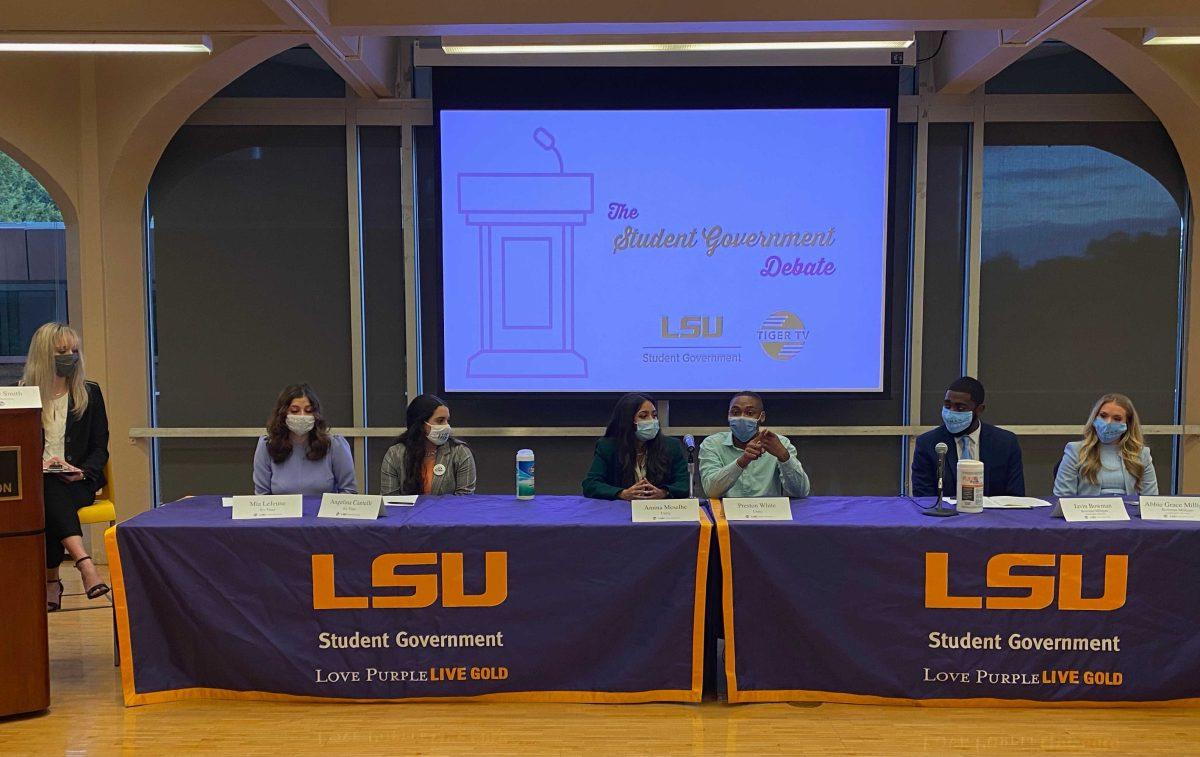LSU students voted at some of the highest rates in Student Government elections last spring. Despite the progress, voter turnout remains significantly low among students.
Just over 5,200 students, or 15% of the student body, voted last spring – an increase of 42% compared to the previous semester.
| Semester | Total Votes | Voting Rate |
| Spring 2018 | 3,243 | 9% |
| Spring 2019 | 3,693 | 10% |
| Spring 2020 | 3,646 | 10% |
| Spring 2021 | 5,207 | 14% |
“This is not a new phenomenon. Voter turnout has been relatively low for years and years,” said Rehn Maham, a junior studying economics and political science, and an associate justice for the university court.
Every spring, LSU students elect a new president, vice president, senators and other positions through TigerLink. An email is sent out around election day with a link for where students vote and the process takes only a few minutes.
This semester, elections take place March 30. Elections for senators and other positions take place in the fall, when turnout is even lower.
“It is generally fairly easy to vote in Student Government elections,” Maham said. “Any student can create a TigerLink account, as long as you’re on the list the registrar gives us of students, you can vote.”
Student Government now uses a rank-choice voting system, where students rank their most preferred candidate to least preferred, in an effort to avoid runoff elections when voting rates are even lower.
Ashyln Anderson, a junior political communications major and SG election chair commissioner, said many students don’t realize how influential SG is and how much their decisions affect students.
“People should be invested in Student Government,” Anderson said. “For president and vice president, these two people will be the liaison between the students and the Faculty Senate. They’re going to be the ones to go up to that senate and, in a sense, be speaking for the students.”
Maham said a “chicken and egg” problem presents itself. On one hand, student representatives are meant to speak for students and advocate for issues they face. But if only 15% of the student body is voting in elections, SG members don’t have a stake in the approval of LSU students.
“If you don’t vote, there’s strong incentive for campaigns to not worry about your vote and to not worry about the issues that you might care about,” Maham said. “If you do vote, campaigns are more incentivized to worry about the issues you do care about, and your fees are more likely to be spent on things you want them spent on. Not voting is a perfectly legitimate option, but if you pick that option, you should know that Student Government is going to be a lot less interested in your voice moving forward.”
SG allocates about $121,000 to various projects and organizations. Just like state and federal legislatures, approving projects and funding can take a long time, as senators debate the importance of different decisions.
If students wanted to see more money go toward the library for renovations, for example, students could push their representatives toward that initiative.
Many of the changes that students want to see cannot be completed in the time that a cabinet is in office. As students graduate, many concerns are inherited by someone who may have not even been at LSU when that direction was taken.
“The process for enacting anything that Student Government wants them to do is actually so much longer than we think,” said Madison Latiolais, political science junior serving as the vice chair of the election commission. “Today, we’re very quick. We want change immediately; we want it now and in a state school, that is more difficult than any of us actually realize. Anything that goes through the state just takes so ridiculously long.”
Sports Administration senior and SG Chief of Senior Executive Staff, Chandler Black, said students who aren’t involved in the LSU community don’t have direct lines of communication with higher ups at LSU who are responsible for important decisions.
“The president and vice president, they text Dr. William Tate, ‘Hey, what’s going on?’ They have a direct line of communication,” Black said.
While TigerLink is accessible to the election commission staff, Black sympathizes with students who are too busy to care about their emails and TigerLink. Voting used to take place on Moodle and forced students to acknowledge its presence simply because of the frequency that Moodle is used.
As the spring 2022 election season approaches, Anderson, Latiolais and Black hope that students will be more involved and genuinely pay attention to the platform that candidates are running on.
“It’s so important to vote for who you genuinely think is going to advocate for you in the best way, not just who had the best stuff during active campaign week,” Latiolais said.






